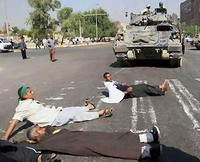Baghdad faces temporary quiet
Absence of bombings and killings in Baghdad won't last without substantial political agreements among the country's sectarian leaders.

The fear: Sunni and Shiite extremist groups responsible for the carnage are still around - bloodied but not destroyed. And many of the key power-sharing issues that fueled the conflict remain unresolved.
Without agreements to resolve them, the conflict could flare up again, as it did after previous lulls. And some of the measures that have helped ease the violence could backfire, triggering new bloodshed.
"The aim of this military operation was to find a period of time to achieve reconciliation among Iraqis," said Dr. Saad al-Hadithi, a political science professor at Baghdad University. "But if the government is hesitant and lacks confidence, then this lull will not last for long."
Time is running out. Starting next spring, the U.S. is expected to begin withdrawing the nearly 30,000 reinforcements that President Bush ordered to Iraq this year at the height of the Shiite-Sunni slaughter.
Without those additional forces, it is uncertain whether those security gains can be maintained unless the Iraqis themselves resolve their differences politically and move toward national healing.
"This really is again the time when they need to take advantage of the window they've been given," U.S. Embassy spokesman Philip Reeker said Monday of the Iraqi leadership.
Prospects for that are uncertain. With only weeks left in the year, Iraq's unwieldy parliament still hasn't approved a new oil law, relaxed the ban on former Saddam Hussein supporters in government, agreed to changes in the constitution or passed other key measures promised by the end of 2007.
Prime Minister Nouri al-Maliki, a Shiite, still has not replaced five Cabinet posts vacated when Sunnis walked out in protest over government policies.
"The improved security situation that we are all experiencing nowadays is temporary," said Nadhim Saied, 32, a Shiite who works for the Electricity Ministry. "I think that all the parties to the conflict are simply monitoring developments. They have not have not abandoned their goals yet."
Still, signs of better security are clear. According to the U.S. military, bombings, shootings and killings have fallen 55 percent since June. American military deaths have been declining too - at least 27 so far this month compared with a high for the year of 126 in May.
U.S. commanders give much of the credit to this year's troop buildup and to a shift in strategy implemented by top commander Gen. David Petraeus.
With additional forces, the U.S. was able to clear many extremist sanctuaries around Baghdad. Notably, the Americans have not cleared Sadr City, stronghold of the biggest Shiite militia, the Mahdi Army of cleric Muqtada al-Sadr.
Key to that strategy was the notion that once American troops cleared sanctuaries, Iraqi security forces would move in and hold them, preventing the extremists from returning.
In Sunni areas, that role is increasingly being played by 70,000 Iraqi irregulars - many of them former insurgents who turned against al-Qaida and agreed to work with the Americans.
The Iraqi government has been slow to embrace such groups, publicly praising them for rejecting al-Qaida while privately stalling on the U.S. goal of integrating them into the army and police. Some Shiite officials fear the volunteers could turn against them someday.
Some analysts believe the speed with which many Sunnis abandoned the insurgency was due in large part to the success of Shiite militias, notably the Mahdi Army, in driving Sunnis from many Baghdad neighborhoods last year.
"The Sunnis lost the battle of Baghdad and understand that they lost it," defense analyst Stephen Biddle said recently. "As a result, Sunnis have come to realize that if this violence goes all out, they lose, they don't win."
With the threat from Sunni extremists diminished, many Shiites began to see the militias not as protectors but ill-disciplined thugs. After a bloody clash between militias spoiled a Shiite religious ceremony in Karbala last August, al-Sadr ordered a six-month freeze on attacks to purge and reorganize the force.
Attacks still occur in Shiite areas, but U.S. officials say they have fallen substantially since al-Sadr's order.
Less clear is the role of Iran, which U.S. officials believe supplies all Shiite groups, especially breakaway Mahdi factions. Iran denies the allegation.
American generals say the flow of weapons from Iran has dropped off sharply since the Iranians assured al-Maliki last August that they would rein in the militias.
Rear Adm. Gregory Smith, a U.S. spokesman, said it was unclear how much Iran had pulled back on its support for the militias "but the trends are going in the right direction."
Many Iraqis hope he's right.
"I do believe that things are getting better because Iraqis are fed up with scenes of destruction everywhere and want to get back to their lives," said Hassan Tawfiq Ali, 45, an Oil Ministry employee. "I think the days of violence and chaos are numbered."
Subscribe to Pravda.Ru Telegram channel, Facebook, RSS!


